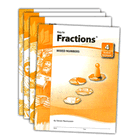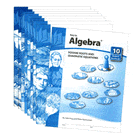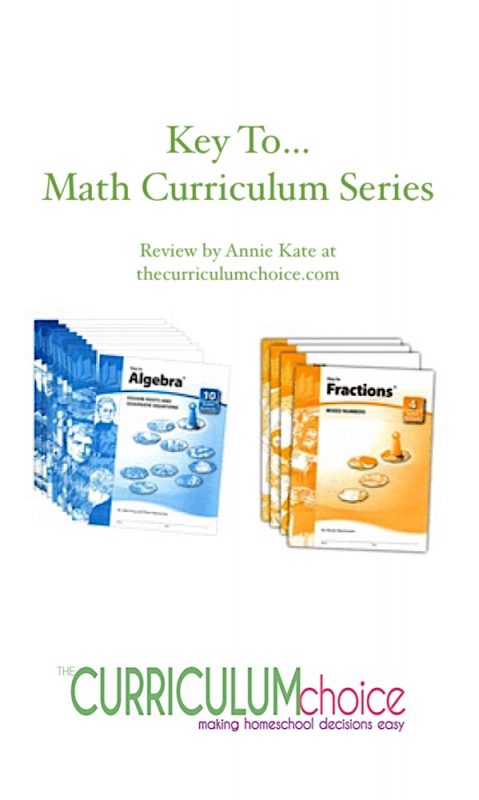As a physicist, I understand, somewhat, the nature of mathematics. It’s actually a language, and children can benefit from being taught it as a language. Among other things, this means using many different resources rather than just one curriculum. One wonderful resource, the Key to Math Curriculum Series, has been a part of our math program for many years now.
 Many people think of the Key To… Math curriculum as a remedial aid. We use it in a completely different way: to increase the children’s ability to understand mathematical concepts on their own. Naturally this also increases their confidence and reduces my workload.
Many people think of the Key To… Math curriculum as a remedial aid. We use it in a completely different way: to increase the children’s ability to understand mathematical concepts on their own. Naturally this also increases their confidence and reduces my workload.
Summary
Key to… Math is a series of teaching workbooks covering Fractions, Decimals, Percents, Measurement, Metric Measurement, Geometry, and Algebra. It spans several years of math instruction and provides a wonderful introduction to each of these topics.
The Key To Math Curriculum Description
Each Key To… topic is made up of a series of workbooks and a teacher’s book containing student pages with all the answers written in. The booklets teach the concepts so simply that my children rarely have to ask me for help. Instead, they learn independent study skills and gain confidence in their ability to teach themselves. There is a lot of practice for each concept, so that by the time a child has finished a series of booklets, he has mastered the concept.
This series is, thus, not a spiral approach to mathematics, but a mastery approach. Obviously, math concepts build on each other so some review is inevitable, but it is not a focus in these books. The lack of review could be a challenge for some children, but mine like learning a topic well, being able to use it, and then moving on.
Each booklet is about 30-40 pages, except for some of the geometry booklets which are combined volumes. Each page is simple, black and white, with space for the answers to be written in. There is no clutter and no distracting color or silliness. (View sample pages by clicking on each workbook here.) Math history is illustrated on the covers of the booklets and explained in detail so that children learn the background of mathematics as well as its substance.
How We Fit Key To…Math Curriculum into our Homeschool

I mark the work as soon as possible, and the children redo each incorrect answer.
Because our children use overlapping curricula as well as various drill programs, they occasionally want to challenge a booklet. I allow them to study it, and then take the end of booklet practice tests just as usual. Although we do not use the available test booklet, we do use the practice tests at the end of each booklet. If our children score over 90% they have completed the booklet, are rewarded, and move on. If their mark is between 80% and 90%, they have to restudy problem concepts, and if they score below 80% they have to buckle down and actually do (or redo) the booklet. In mathematics it’s no use moving on to more difficult concepts if earlier concepts are not mastered.
Each year the children study several workbooks, and we aim to finish Fractions, Decimals, Percents, and Metric Measurement by the middle of grade 6. Metric Measurement is a treat that gets divided up over the three years, because it is hands-on and full of simple projects.
After that, the children take a break from the Key To… Series and review it all by whizzing through Singapore Math 3a to 6b almost entirely on their own. Then I have them struggle through the Singapore PSLE book. By that time they are well into grade 7 and ready to work through Key to Geometry and start Key to Algebra. After the fifth algebra booklet, they do Singapore’s NEM 1, and then return to Key to Algebra before finishing the NEM series. Singapore math is known to be advanced and teacher-intensive, but after using the Key To… Series my children are able to learn Singapore math almost entirely on their own.
What We Think about The Key To… Math Curriculum
If your child does not do well with the spiral approach to learning mathematics, try the mastery approach. In these booklets, each concept is taught thoroughly until a child knows it.
Our children needed more drill and more practice with large number multiplication and division than was provided in this series. Other than that, the elementary Key To… Series is a wonderful curriculum. Our children do well at math, understand it, and are not afraid of it.
Key to Geometry is an amazing hands-on course, but it does not meet the geometry needs of a high school student. It gives an intuitive understanding that helps with a later logic-based geometry course, though.
Key to Algebra is a great introduction and confidence booster, but it is not a final algebra course. It really helps students understand the concepts as opposed to just telling them what to do.
I love the Key To…Series booklets. They give my children confidence, teach them math rather than techniques, and reduce my teaching load.
Disclosure: We have been using the Key To…Series for many years. I received nothing from Key Curriculum Press in order to write this review.
-Written by Annie Kate, a Christian homeschooling mom of five great children, who blogs at Tea Time With Annie Kate.
You might also like:
Have you subscribed to The Curriculum Choice so you won’t miss any homeschool reviews?
-originally published September 2010


I have heard of Key to and looked at them often. This just really might be that extra boost we need now and then. Thank you.
We use these from about grade four, I love them… I love that my kids can learn on their own. I am all for independent learning and giving them something they can do on their own that isn’t just just minding time. I like that the steps are teeny tiny incremental steps so they don’t feel like they are doing something totally new each day!!! We just do a page a day to supplement their other math that they need my help and attention for.
.-= Se7en´s last blog ..Se7en Whip Up a Galaxy of Paper Planets… =-.
I am new to this curriculum but have been working through Miquon with my kids. I am wondering, do you work through every booklet in one topic like fractions, before moving onto decimals? Or do you jump between books as a means of revisiting topics? I plan to begin the Keys To series this fall and I am not sure how to proceed. Thanks!
You work through booklets like Fractions completely, because subsequent booklets assume the skills you learn in that series.
If you want spiral learning with significant review, you’ll need to use another resource in addition to this one.
That being said, the Measurement books can be spread out; we use them for a fun break.
Annie Kate, I am very grateful for this review of the “Key To” series. Our rising 6th grader is starting Saxon Math 8/7 next year and I am planning on focusing on decimals & fractions with her to help increase success in algebra. We have used Math Mammoth in the past to teach some concepts and although there is nothing wrong with the program it is just not my favorite. I was thinking about incorporating Key To into our studies. This post has helped me to both understand the Key to Series and to appreciate some of its’ unique qualities of which I was unaware. I am grateful to follow after you! Blessings Kyle
Good Morning
We are a Montessori School in South Africa
And interested in your curriculum.
I see you only have your books in print format but I am worried about them point safely to us.
Have you shippers safely to SA before?
Regards Janet Clarke
Hi Janet,
Whichever curriculum supplier you normally use will be able to get these books for you, however well that normally works.
If you need a downloadable curriculum instead, some of those are available as well, but as far as I know none of them use this particular philosophy for teaching math. Math Mammoth is quite good, though, and you can download it. Here’s a link to that curriculum: https://www.mathmammoth.com/
We have ordered all of the key to math series booklets including geometry and algebra. Most of what I’m finding online is people saying the algebra is more of a pre algebra and geometry is not complete. Would you agree with that? Also if we are to finish all of those booklets what curriculum do you use after that? I am just getting to this age with my oldest and so naturally have not homeschooled this age group in math yet. Looking for direction I guess LOL. Also should comment that my son is very proficient in math, learns very quickly and is not afraid of math. We started doing some of the horizons math and it just feels very boring to him as far as repetition goes. Basically I’m wondering if we finish all of the booklets what “grade level” would he be in and what math would he be going on to? He would like to have a career in something that needs math quite a bit so I want to make sure he is very proficient. But I also don’t want to bore him and meddle in math if you will. Thank you!! HR
I see that your children work through Miquon Math which covers through grade 3 then do Key to series. When do they learn multi digit muliplication or long division? My son is 4th grade, struggles with facts, but grasps concepts easily. We are struggling through multidigit multiplication now, but I feel like we are behind if we don’t move forward with fractions, etc. What do you suggest?
What resource did you use for Singapore PSLE and where did you order it? Are there teacher guides for NEM?